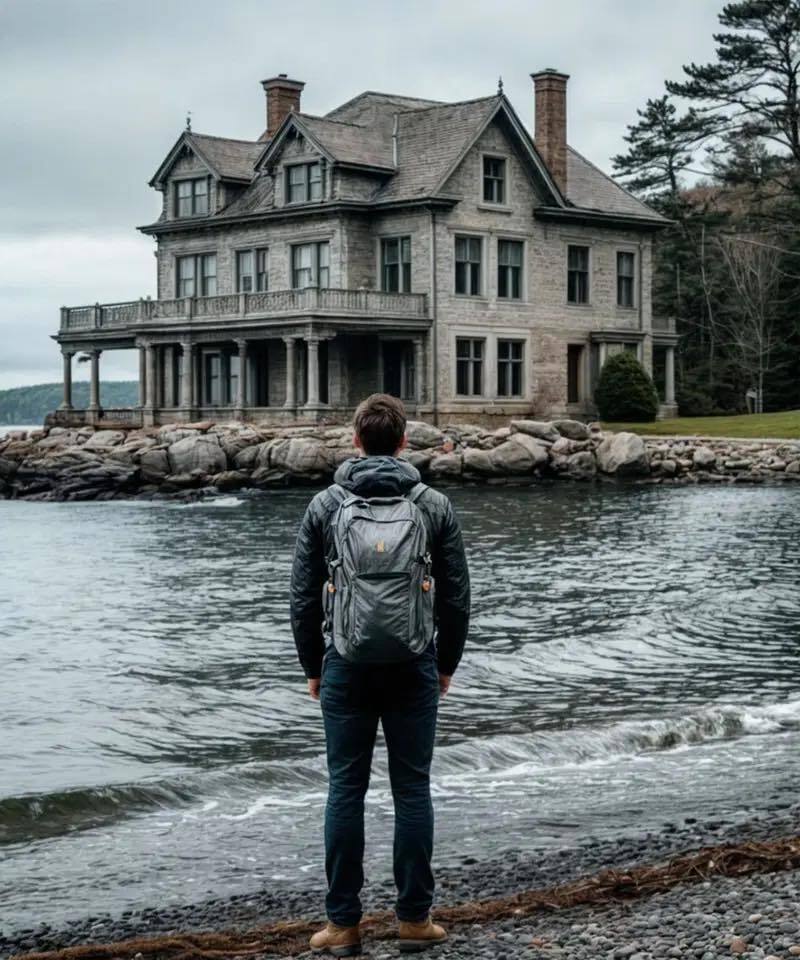As Elliott Row stood at the stove preparing breakfast, the rich smell of garlic and butter filled the air. An omelet sizzled in the pan when his phone rang unexpectedly. He glanced at the unfamiliar number and answered, distracted. The voice on the other end introduced himself as a family notary and informed Elliott that he needed to come in the next morning regarding an inheritance. This surprised Elliott—his parents were both alive, so who could have left him anything?

He didn’t ask questions, just nodded silently and hung up. The next day was shrouded in fog as he drove across the city. His mild confusion had grown into irritation by the time he arrived. The notary greeted him at the door and led him into a strangely quiet office, explaining that this was no ordinary situation. Sitting across from him, Elliott listened warily as the notary mentioned the name Walter Jonas. Elliott protested—he didn’t have an uncle by that name. The notary insisted he had inherited a property from Walter and laid out an old key, a faded map, and an address. A house located in the middle of Lake Konamah in central Connecticut was now his. Still skeptical, Elliott took the key. It was heavy, with an old, worn design.
Though he had no memory of the man or the lake, something about it drew him in. Within an hour, he had packed a bag and set out. According to his GPS, the lake was only forty minutes away—a place he’d never heard of, making it all the more intriguing. When he arrived, the lake lay still like glass, and in its center stood a dark, looming mansion. Curious, he approached a nearby café where a few elderly men sat outside. He asked them about the house. One replied solemnly that the town didn’t speak of that place. It was supposed to have disappeared long ago. Though no one had ever been seen entering or leaving, boats came at night to restock supplies. At the pier, Elliott found a faded sign reading “June’s Boats.” Inside, a tired woman met his request for a boat ride with hesitation. He handed her the key and explained he had inherited the property. She refused at first, saying the place frightened her, but finally relented under his persistence. She agreed to drop him off but warned she would return the next day and wouldn’t wait.
The house looked like a fortress rising from the water. When the boat docked, Elliott stepped onto the creaky pier, barely thanking June before she disappeared into the fog. He was alone. The key turned smoothly in the lock, and the heavy door creaked open. Inside, the air was thick with dust, but not unpleasant. Light filtered through tall windows, partially blocked by curtains. Portraits lined the walls, one of which showed a man beside the very house, labeled Walter Jonas, 1964. In the library, books filled the shelves, many with handwritten notes. A telescope stood in the study, surrounded by weather journals, the most recent dated just weeks ago. In the bedroom, stopped clocks and a locket with a baby’s picture labeled “Row” raised questions. A note on the mirror read: “Time reveals what seemed long forgotten.” In the attic, Elliott discovered clippings of news articles—one circled in red was about a boy who disappeared in 1997 and was later found unharmed. It was him. More unsettling was a school photo of himself placed on a dining chair.
That night, he tried to sleep but couldn’t. Strange creaks and shadows unnerved him. Then a metallic clang startled him awake. A hidden iron door behind a tapestry led him down a spiral staircase. The air grew damp as he descended into a long corridor with labeled drawers. One read “Row.” Inside were letters addressed to his father, pleading for contact and referencing Elliott. At the end was a massive door labeled “Jonas Archive,” marked “Only for Elliott Row.” He placed his palm on the scanner. The door opened, and a projector displayed a man with tired eyes. “Hello, Elliott. If you’re seeing this, I’m gone. I’m your real father,” the man said. He explained how Elliott’s mother died during childbirth, and how, consumed by fear and scientific obsession, he had given Elliott to his brother to raise. He watched from afar but never stepped in. The message ended with an apology and pride in the man Elliott had become. Numb, Elliott sat in silence before returning upstairs. By dawn, June was waiting. She asked if he was okay. “Now I am,” he replied. At home, he told his parents. They embraced him, apologizing for the silence. Weeks later, Elliott returned—not to live there, but to transform the house. It reopened as a Center for Climate and History Studies. Children ran through its halls, laughter replaced the silence, and a place once haunted by secrets became a symbol of life, discovery, and healing.





